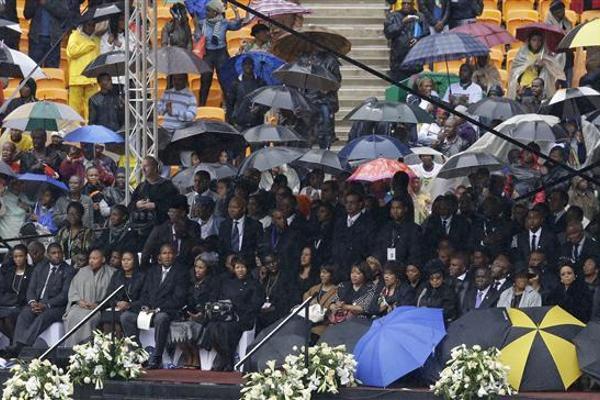South Africa and world unite for Mandela memorial
SOWETO - Agence France-Presse


Members of the Mandela family take their seats on the stand during the memorial service for former South African president Nelson Mandela at the FNB Stadium in Soweto, near Johannesburg, South Africa, Tuesday Dec. 10, 2013. AP photo
Tens of thousands of South Africans united in proud, noisy celebration Dec. 10 at a rain-soaked emotional memorial service to global freedom icon Nelson Mandela, attended by presidents and princes and watched by millions around the world.Songs of praise and revolution, many harking back to the apartheid era that Mandela helped condemn to history, echoed around the giant stadium in Soweto where close to 100 world leaders had come to pay tribute to a man whose life story earned uncommon universal respect.
The event began at midday (1000 GMT) with a stirring rendition of the national anthem, Nkosi Sikelel' iAfrika (God Bless Africa), led by a mass choir and picked up with enthusiasm by the rest of the stadium.
Some 80,000 had been expected, but the venue was two-thirds full as the ceremony got underway under a curtain of rain that had been falling since the early morning.
Despite the profound sense of national sorrow triggered by Mandela's death last Thursday, the mood was upbeat, with people determined to celebrate the memory of one of the 20th century's towering political figures.
"His long walk is over, he can finally rest," African National Congress (ANC) Vice President Cyril Ramaphosa said in an opening address.
In his tribute, UN Secretary General Ban Ki-moon noted that Mandela had managed to unite people in death, much as he had in life.
"Look around this stage ... we see leaders representing many points of view ... all here, all united," he said. US President Barack Obama and Cuban President Raul Castro were both listed to deliver personal tributes, pausing a diplomatic rivalry dating back to the Cold War.
Crowds had begun gathering before daybreak and, as the gates opened, they swarmed into the stadium, where Mandela made his last major public appearance at the 2010 World Cup final.
Wrapped in the South African flag or yellow-green coloured shawls printed with the slogan "Mandela Forever," they danced and sang, oblivious to the constant drizzle.
"He's God given, he's God taken. We will never stop to cherish him," said Shahim Ismail, who took a day off from the sports academy he runs in Johannesburg to attend the event.
"This is once in your life. This is history," said Noma Kova, 36. "I didn't want to watch this on TV." Mandela's widow, Graca Machel, received a huge ovation as she took her seat on the main stage constructed at one end of the pitch, while the entrance of President Jacob Zuma was roundly booed by a portion of the crowd.
Mandela's ex-wife Winnie Madikizela-Mandela was also present.
Obama missed the first hour of the ceremony, as his motorcade struggled through the rain-deluged route to the stadium, but was loudly cheered on his arrival.
News of Mandela's death at his home in Johannesburg resonated around the world, triggering a wave of loving admiration from political and religious leaders, some of whom agree on little else.
The Indian and Brazilian presidents were also selected to deliver eulogies, reflecting Mandela's extraordinary global reach, popularity and influence.
Obama and his wife Michelle flew in on Air Force One early in the morning, together with former president George W. Bush and his wife Laura.
Two other ex-presidents, Bill Clinton and Jimmy Carter, were arriving separately.
The memorial event was part of an extended state funeral that will culminate in Mandela's burial on Sunday in the rural village of Qunu where he spent his early childhood.
Although Mandela had been critically ill for months, the announcement of his death was a body blow for this recently reborn nation.
He had been out of public life for more than a decade, but South Africans looked to his unassailable moral authority as a comforting constant in a time of uncertain social and economic change.
On the eve of the memorial, Nobel laureate Desmond Tutu described Mandela as a "magician" who conjured a united nation out of a country teetering on the brink of civil war.
And his eldest daughter, Makaziwe Mandela, told how her father spent a "wonderful" week surrounded by family before he died.
"The children were there, the grandchildren were there ... so we are always around him, even at the last moment," she told the BBC.
Ahead of the burial in Qunu, Mandela's body will lie in state for three days from Wednesday in the amphitheatre of the Union Buildings in Pretoria where he was sworn in as president in 1994.
Each morning, his coffin will be borne through the streets of the capital in a funeral cortege, to give as many people as possible the chance to pay their final respects.
British Prime Minister David Cameron, French President Francois Hollande and Afghan President Hamid Karzai were among the leaders attending the memorial ceremony.
"We were told it was appropriate to wear a black tie," Cameron said after arriving at the stadium in Soweto.
"But when you come and your hear this great noise and this great atmosphere of celebration, it is clear that people here in South Africa want to, yes, say goodbye to this great man, yes commemorate what he did, but also celebrate his life and celebrate his legacy," he said.
Africa was represented by Nigeria's Goodluck Jonathan and more than a dozen other heads of state and government.
Singer-activist Bono and South African actress Charlize Theron were among the celebrity mourners.
One radiant celebrant in the crowd, Musa Mbele, his clothes drenched by the rain, declined the offer of an umbrella.
"If he was able to stay behind bars for 27 years for us, what is one day, just one rain-drenched day?" he said.
